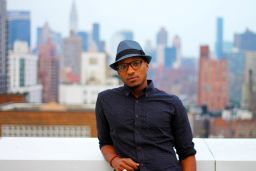Editor’s note: David A. Wilson is the co-founder and executive editor of TheGrio.com, a site dedicated to news and perspectives that affect and reflect black America. Follow him on Twitter and Instagram @mrdavidawilson. The opinions expressed in this commentary are his.
Story highlights
David A. Wilson: Police who turned backs on mayor are in denial about a problem
He says neither cops nor community really understand each others' perspective
On Sunday, outside the funeral of Officer Wenjian Liu, thousands of NYPD officers turned their backs on Mayor Bill de Blasio yet again and as a result forfeited an opportunity for the city to unite. Police Commissioner William Bratton even said to his force that it’s a time for “grief and not grievance.”
But many of New York’s finest are still upset at the mayor for sharing a message that many black and brown parents relay to their children every day. In early December, during the height of the Eric Garner protests, de Blasio said, “because of a history that still hangs over us,” he and his wife taught their biracial son “how to take special care in any encounter he has with the police officers who are there to protect him.”

Why this came as a shock to a police force with 47% minority officers, serving a city where nearly 40% of its residents are either black or Latino, baffles me. As a black man, this was a lesson I received from my parents growing up, which they received from my grandparents.
I’ve had very few negative run-ins with law enforcement (ironically because of the lesson that they now seem to disdain). I do believe that 99% of police officers are good-hearted individuals who care deeply about the city. But their unfortunate response to the mayor supports negative stereotypes against them and only reinforces the need for African-American and Latino families to teach their children extreme caution around men in blue uniforms.
That said, what the NYPD and communities of color often fail to do is place themselves in each other’s shoes. Protesters should weed out any hateful rhetoric toward cops, and police must stop pinning the blame of their colleagues’ deaths on anyone but Ismaaiyl Brinsley.
I can only imagine what it’s like to be a police officer. You leave your family and home each morning, not knowing if you will see them again because you may be killed on the job. It must be difficult to have to rush into dangerous situations that most people – including me – would run away from. It has to be stressful to be thrust into moments where a split-second decision can mean life or death for you and others.
If I were a police officer, I could imagine the indignation I would have toward anyone who would dare question me or my colleagues’ ethics and morality when we place our lives on the line for perfect strangers from all races each and every day.
The murders of Officers Liu and Rafael Ramos are NYPD officers’ worst fears realized. The mayor could have just as easily been speaking at any one of their funerals. It could have been them patrolling the streets of Bed-Stuy Brooklyn. It could have been them executed by a gunman whose sole purpose that day was to kill cops. Their children, wives and mothers could have been the ones spending the holidays without their father, husband and son.
But if this city and this nation are to ever to heal from this moment, law enforcement must begin to better understand the communities that they serve.
If only they will recognize that the fear and frustration that the fates of Liu and Ramos evokes in them is tantamount to the emotions that the deaths of Eric Garner and Akai Gurley conjures in black New Yorkers, then there might be hope for unity.
I am a college-educated black man who runs his own business. I’ve never been in trouble with the law. Yet history has proved that as a black man, none of my accolades exempt me from the possibility of being wrongfully killed by law enforcement. This fear is what’s behind the outrage fueling the protests across the country.
This fear is rooted in a long history that de Blasio referenced, when local police departments were fraternities for white supremacists seeking to do harm to people of color under the protection of the law.
Every police officer needs to understand that every death of a black man at the hands of law enforcement is a painful reminder of that horrible legacy. It’s not just anecdotal incidents that confirm our fears but the fact that black teens are 20 times more likely to be killed by police than white teens.
But even if many police officers reject the notion that a bias exists, is it not their jobs as our protectors to understand what keeps us up at night?
The only way NYPD officers can help alleviate those fears is by acknowledging them and then to begin a dialogue to help change the narrative. And there is no time better than now; while we are all mourning the loss of Eric Garner, Rafael Ramos and Wenjian Liu.
I do hope the next time NYPD officers are in the presence of Mayor de Blasio, they resist turning their backs on him because that’s an awful way to start the conversation that we all need to have.
TheGrio.com: If the NYPD treats the mayor this bad in public …
Read CNNOpinion’s new Flipboard magazine.












